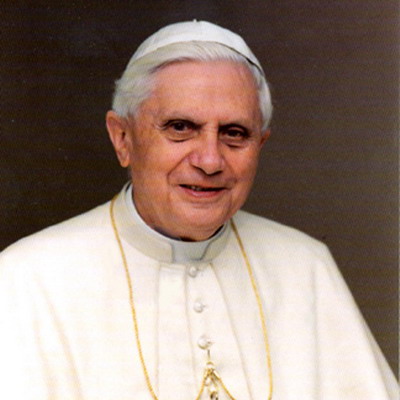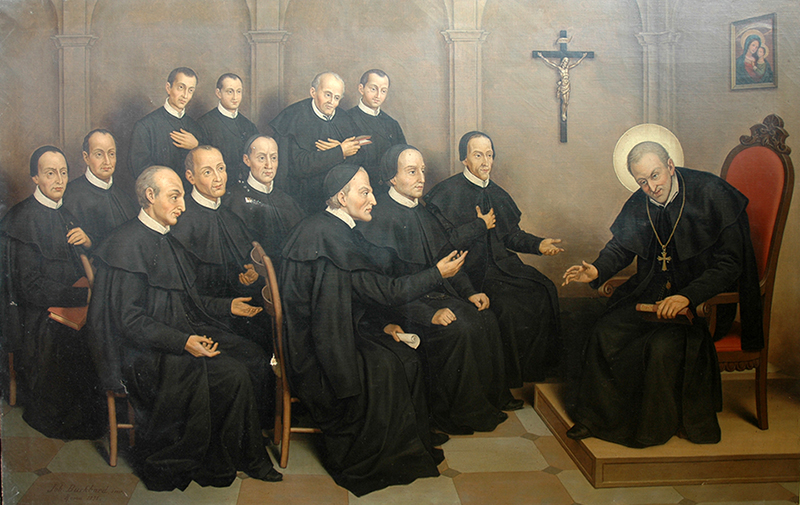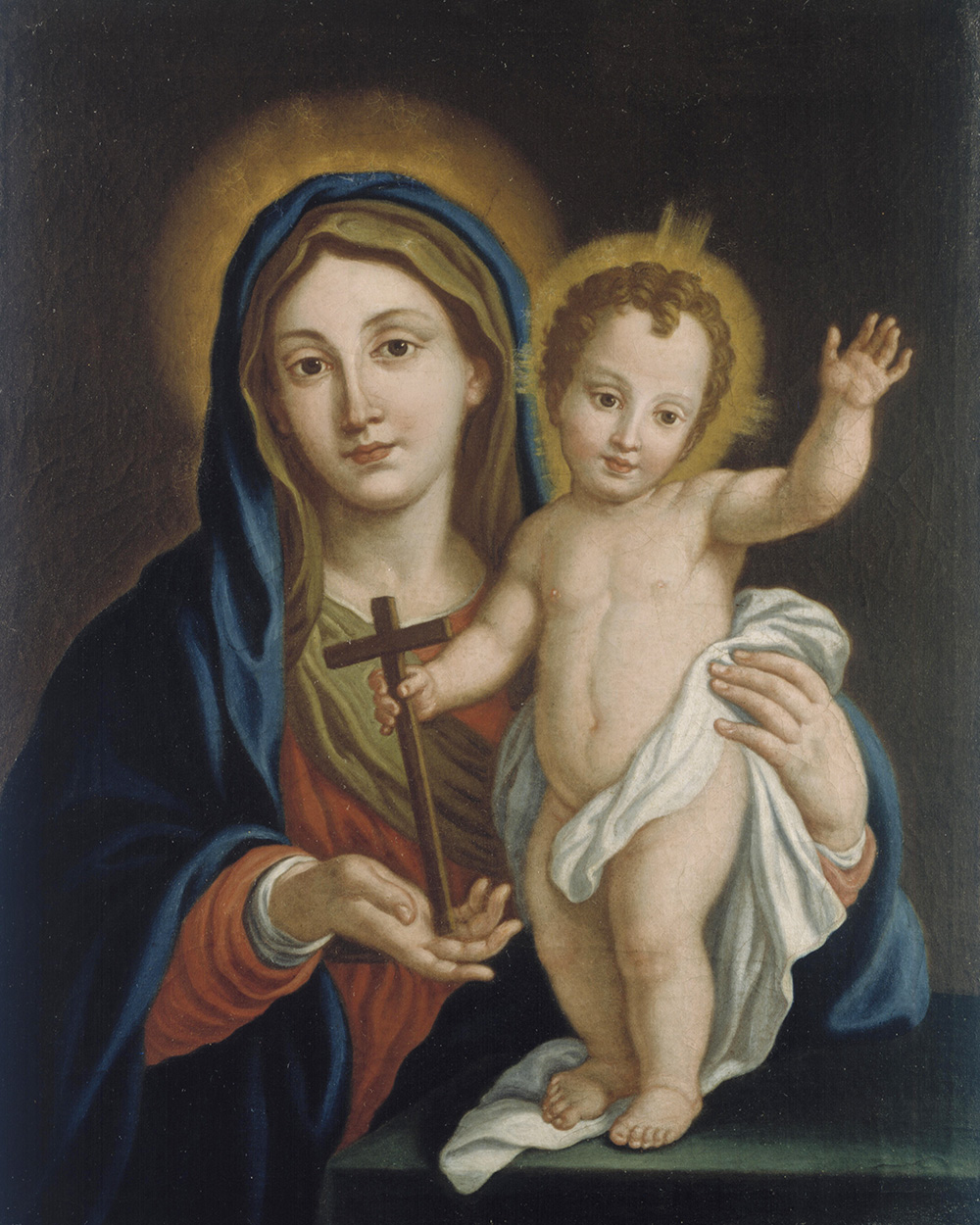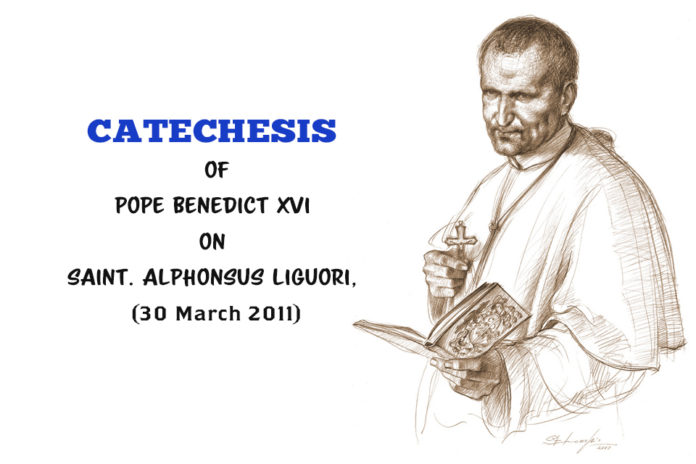The Redemptorists all over the world celebrated the feast of Saint. Alphonsus Maria de Liguori (1696-1787) on Thursday, August 1, our Founder, who in the liturgy of the whole Church is known as a living memory. He founded the religious congregation of the Most Holy Redeemer, which today counts almost 5000 members who proclaim abundant redemption in 82 countries around the world.
In one of his catecheses, during the General Audience, Pope Benedict XVI stressed that Saint. Alphonsus Liguori was “a remarkable moral theologian and master of spiritual life for all, and above all for simple people.” He showed him as the precursor of the new evangelization and a model of a zealous shepherd who tirelessly served the faithful by preaching the Gospel and searching for lost souls among the most neglected strata of society.
Saint Pope John Paul II in the Apostolic Letter on the occasion of the 200th anniversary of his death wrote that Saint. Alphonse was “a master of wisdom and father in faith”, “teacher of the Christian life” and “a great friend of the people.” It is worth recalling what Pope Benedict XVI spoke about St. Alphonsus earlier.
Catechesis of the Holy Father Benedict XVI on Saint. Alphonsus Liguori, 30 March 2011.
 Today I would like to present to you the figure of one of the Doctors of the Church, of whom we are great debtors because he was an eminent moral theologian and master of spiritual life for all, and above all for simple people. He is the author of the words and music of one of the best-known in Italy and not only carols Tu scendi dalle stelle (You descended from distant stars ).
Today I would like to present to you the figure of one of the Doctors of the Church, of whom we are great debtors because he was an eminent moral theologian and master of spiritual life for all, and above all for simple people. He is the author of the words and music of one of the best-known in Italy and not only carols Tu scendi dalle stelle (You descended from distant stars ).
Saint Alphonsus Maria de Liguori, born of a noble and rich Neapolitan family, was born in 1696. Equipped with outstanding intellectual skills, at the age of 16 he received a doctorate in civil and canon law. He was the most eminent lawyer in Naples; in eight years he won all the matters he defended. However, in his soul, thirsty for God and desiring perfection, God led him to understand that the calling, to which he was called, was different. In fact, in 1723, outraged by corruption and injustice, which the judicial environment was tainted, he abandoned his profession, and with it wealth and success, and decided to become a priest despite his father’s objection. He had the best teachers who led him in studying the Holy Scriptures, church history and mysticism. He acquired a deep theological culture that resulted when he soon began writing works. He was ordained a priest in 1726 and, to fulfil his priestly ministry, he became associated with the diocesan Congregation of the Apostolic Missions. Saint Alphonsus began evangelization and catechetical activity among the people of the poorest Neapolitan community, who passionately preached the Gospel and taught about the basic truths of faith.
Many of those he addressed were simple and poor people, very often succumbing to addictions and being involved in criminal activities. With great patience, he taught them prayers, encouraging them to improve their lives. St. Alphonsus achieved great results: in the poorest districts of the city multiplied groups of people who in the evening gathered in private homes and workshops to pray and meditate on God’s Word under the direction of catechists prepared by St. Alphonsus and other priests who regularly visited these groups of the faithful. When, according to the wishes of the archbishop of Naples, these meetings began to take place in the chapels of the city, they adopted the name of “evening chapels.” They were a real and special source of moral education, resocialization, and mutual help among the poor.
Even if the social and religious context of the era of Saint. Alphonsus was very different from ours, the “evening chapels” turn out to be a model of missionary action, from which we can also draw inspiration for a new evangelization, especially the poorest, and for building a more just, fraternal and solidarity interpersonal coexistence. Priests have been entrusted with the task of spiritual ministry, while well-formed lay people can become effective Christian animators, an evangelical leaven within society. With the intention of ongoing mission for the evangelization of pagan peoples, Saint. Alphonsus de Liguori, at the age of 35, encounters poor peasants and shepherds in the remote mountain regions of the Kingdom of Naples and, touched by their religious ignorance and abandonment, decides to abandon the capital and devote themselves to those poor in spirit and in material terms.
 In 1732, he founded the Congregation of the Most Holy Redeemer, which he entrusted to the care of bishop Thomas Falcoia, whom he later became the superior. These monks, led by Saint. Alphonsus, they were real nomadic apostles, reaching even the most remote villages, calling for conversion and perseverance in Christian life, above all through prayer. Also today, Redemptorists, spread all over the world, undertaking new forms of the apostolate, continue this mission of evangelization. I am thinking of them with appreciation, encouraging them to always be faithful to the example of their Holy Founder. He was valued for goodness and pastoral zeal, in 1762 Alphonsus was appointed a bishop of the diocese of Sant’ Agata dei Goti. He retired from the office, due to the diseases that he had to suffer, he filed in 1775 with the consent of the Holy Father Pius VI. The same Pope, at the news of the death of Saint. Alphonsus in 1787, preceded by numerous sufferings, cried: “He was a saint!” He was not mistaken: in 1839, Alphonsus was canonized, and in 1871 proclaimed the Doctor of the Church. This title has been awarded to him for a number of reasons. First of all, because he left abundant teaching in the field of moral theology, which faithfully expresses the Catholic doctrine to such an extent that it was proclaimed by Pope Pius XII “Patron of all confessors and moralists”. At the time of his contemporaries, a very rigorous interpretation of moral life was widespread, which instead of inspiring trust and hope in God’s mercy, aroused fear and showed the anger and austere face of God, very far from what Jesus revealed to us.
In 1732, he founded the Congregation of the Most Holy Redeemer, which he entrusted to the care of bishop Thomas Falcoia, whom he later became the superior. These monks, led by Saint. Alphonsus, they were real nomadic apostles, reaching even the most remote villages, calling for conversion and perseverance in Christian life, above all through prayer. Also today, Redemptorists, spread all over the world, undertaking new forms of the apostolate, continue this mission of evangelization. I am thinking of them with appreciation, encouraging them to always be faithful to the example of their Holy Founder. He was valued for goodness and pastoral zeal, in 1762 Alphonsus was appointed a bishop of the diocese of Sant’ Agata dei Goti. He retired from the office, due to the diseases that he had to suffer, he filed in 1775 with the consent of the Holy Father Pius VI. The same Pope, at the news of the death of Saint. Alphonsus in 1787, preceded by numerous sufferings, cried: “He was a saint!” He was not mistaken: in 1839, Alphonsus was canonized, and in 1871 proclaimed the Doctor of the Church. This title has been awarded to him for a number of reasons. First of all, because he left abundant teaching in the field of moral theology, which faithfully expresses the Catholic doctrine to such an extent that it was proclaimed by Pope Pius XII “Patron of all confessors and moralists”. At the time of his contemporaries, a very rigorous interpretation of moral life was widespread, which instead of inspiring trust and hope in God’s mercy, aroused fear and showed the anger and austere face of God, very far from what Jesus revealed to us.
Saint Alphonsus, especially in his main work entitled “Theology of Morale ” (Moral Theology), presents a balanced and convincing synthesis of the requirements of God’s law engraved in our hearts, fully revealed by Christ and authoritatively interpreted by the Church, and dictates of conscience and human freedom, which through adherence to truth and good lead to the maturity and realization of a person. Priests and confessors of Saint. Alphonsus recommended that they be faithful to the moral Catholic doctrine while accepting an attitude of mercy, forbearance and gentleness so that penitents may feel guided, supported and encouraged in their way of faith and the Christian life. Saint Alphonsus never ceased to repeat that the priests are a visible sign of the infinite mercy of God who forgives and enlightens the mind and heart of the sinner to convert and change his life. In our age, in which we notice the clear signs of loss of moral conscience and – what should be said with concern – a certain lack of respect for the Sacrament of Penance, the teaching of Saint. Alphonsus is still very up to date.
 Next to the theological works of Saint. Alphonsus, he wrote many other books intended for the religious formation of the people. Their style is simple and inviting. Read and translated into many languages works of Saint. Alphonsus contributed to the formation of folk spirituality of the last two centuries. Some of them are texts that can be read and are very useful today, such as eternal truths, glories of Mary, love of Jesus Christ in everyday life. This last book is a synthesis of his teaching and is his masterpiece. It puts a strong emphasis on the necessity of prayer, which allows us to open ourselves to the grace of God, to do God’s will every day and achieve our own sanctification. Regarding prayer, he writes: “God does not deny to any one the grace of prayer through which man receives help to overcome all lust and temptation. I say and repeat, and I will repeat always as long as I live, that all our salvation is in prayer. “Hence his famous statement: “He who prays, he will be saved” (Prayer – means of salvation). Consequently, the encouragement of my predecessor, the venerable Servant of God, John Paul II, comes to my mind: “Our Christian communities must become true schools of prayer. Therefore, education in prayer must be in some way a key element of all pastoral programs.” (Novo Millennio Ineunte, 33, 34).
Next to the theological works of Saint. Alphonsus, he wrote many other books intended for the religious formation of the people. Their style is simple and inviting. Read and translated into many languages works of Saint. Alphonsus contributed to the formation of folk spirituality of the last two centuries. Some of them are texts that can be read and are very useful today, such as eternal truths, glories of Mary, love of Jesus Christ in everyday life. This last book is a synthesis of his teaching and is his masterpiece. It puts a strong emphasis on the necessity of prayer, which allows us to open ourselves to the grace of God, to do God’s will every day and achieve our own sanctification. Regarding prayer, he writes: “God does not deny to any one the grace of prayer through which man receives help to overcome all lust and temptation. I say and repeat, and I will repeat always as long as I live, that all our salvation is in prayer. “Hence his famous statement: “He who prays, he will be saved” (Prayer – means of salvation). Consequently, the encouragement of my predecessor, the venerable Servant of God, John Paul II, comes to my mind: “Our Christian communities must become true schools of prayer. Therefore, education in prayer must be in some way a key element of all pastoral programs.” (Novo Millennio Ineunte, 33, 34).
Among the forms of prayer strongly recommended by Saint. Alphonsus is distinguished by the visitation of the Blessed Sacrament or – as we would say today – adoration, short or long, personal or communal before the Blessed Sacrament. “Of course,” writes Saint. Alphonsus – among all forms of piety, the adoration of Jesus in the Blessed Sacrament is the first after the sacraments, the most pleasing to God and the most useful for … Oh, how wonderful it is to be faithful to the altar … and to present your needs to him as a Friend to a Friend in whom he puts all trust “(Visitation of the Blessed Sacrament and the Blessed Virgin Mary for each day of the month).
 The Alphonsian spirituality is in fact extremely Christological, focused on Christ and his Gospel. The considerations of the mystery of the Incarnation and Passion of the Lord are often the subject of his preaching. In these events, redemption was given to people “abundantly”. Here is also an explanation of why the Alphonsian devotion is also very Marian. In love with Mary, Alphonsus shows her role in the history of salvation: as a participant in the work of redemption and Mediatrix of Grace, Mother, Advocate and Queen. In addition, Saint. Alphonsus emphasizes that the devotion to Mary will be a great strengthening for us at the time of our death. He was convinced that contemplating our eternal destiny, our calling to participate in the happiness of God,
The Alphonsian spirituality is in fact extremely Christological, focused on Christ and his Gospel. The considerations of the mystery of the Incarnation and Passion of the Lord are often the subject of his preaching. In these events, redemption was given to people “abundantly”. Here is also an explanation of why the Alphonsian devotion is also very Marian. In love with Mary, Alphonsus shows her role in the history of salvation: as a participant in the work of redemption and Mediatrix of Grace, Mother, Advocate and Queen. In addition, Saint. Alphonsus emphasizes that the devotion to Mary will be a great strengthening for us at the time of our death. He was convinced that contemplating our eternal destiny, our calling to participate in the happiness of God,
Saint Alphonsus de Liguori is an example of a zealous shepherd who was acquiring souls, preaching the Gospel and celebrating the sacraments, with which the style of conduct marked by gentle and humble goodness was born, which arose from an intense relationship with God, Infinite Goodness. He possessed a realistically optimistic vision of the layers of good that the Lord gives to every man, and in addition to emphasizing the role of reason, he gave an important place to the feelings and desires of the heart in the love of God and neighbour.
In conclusion, I would like to remind you that our saint, analogous to Saint. Saint Francis de Sales – I talked about a few weeks ago – does not cease to say that every Christian is called to holiness: “Religious as a religious, secular as a layman, priest as a priest, spouse as a husband, merchant as a merchant, soldier as a soldier, and so you could name the representatives of each state “(Beloved Jesus Christ in everyday life ). We thank the Lord for the invocation of saints and doctors in their times and places who speak the same language, inviting us to grow in faith and live with the love and joy of our being Christians in ordinary daily activities to follow the path of holiness, way to God and full of joy.
Prayer of the day
God, you give your Church new examples of the Christian life, make us imitate Saint Alphonsus in apostolic zeal and with him to win the reward in heaven. Through Christ, our Lord. Amen.
Prayer for vocations by the intercession of Saint. Alphonsus
Lord Jesus Christ, you have shaped Saint. Alphonsus Maria in the spirit of apostolic love and made him in your Church a shepherd of poor people and people in need of spiritual help. We ask You through his intercession, raise in our homeland numerous vocations to priestly, religious and missionary life. Endow the Redemptorist Congregation that he founded with new hosts of young people, that today, and in the future, they bring your abundant redemption to the poor and abandoned. You who live and reign forever and ever. Amen.
(www.redemptor.pl)





